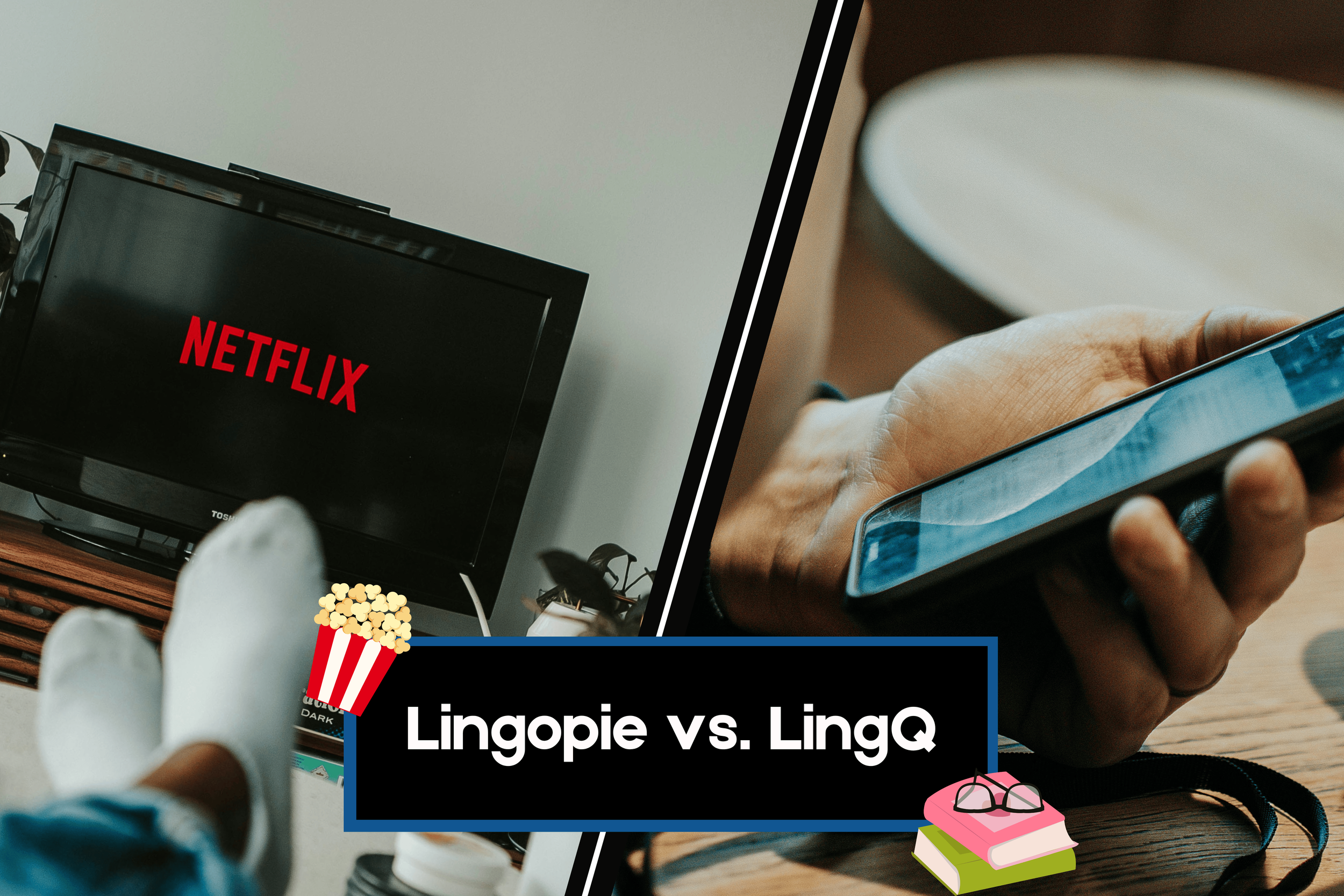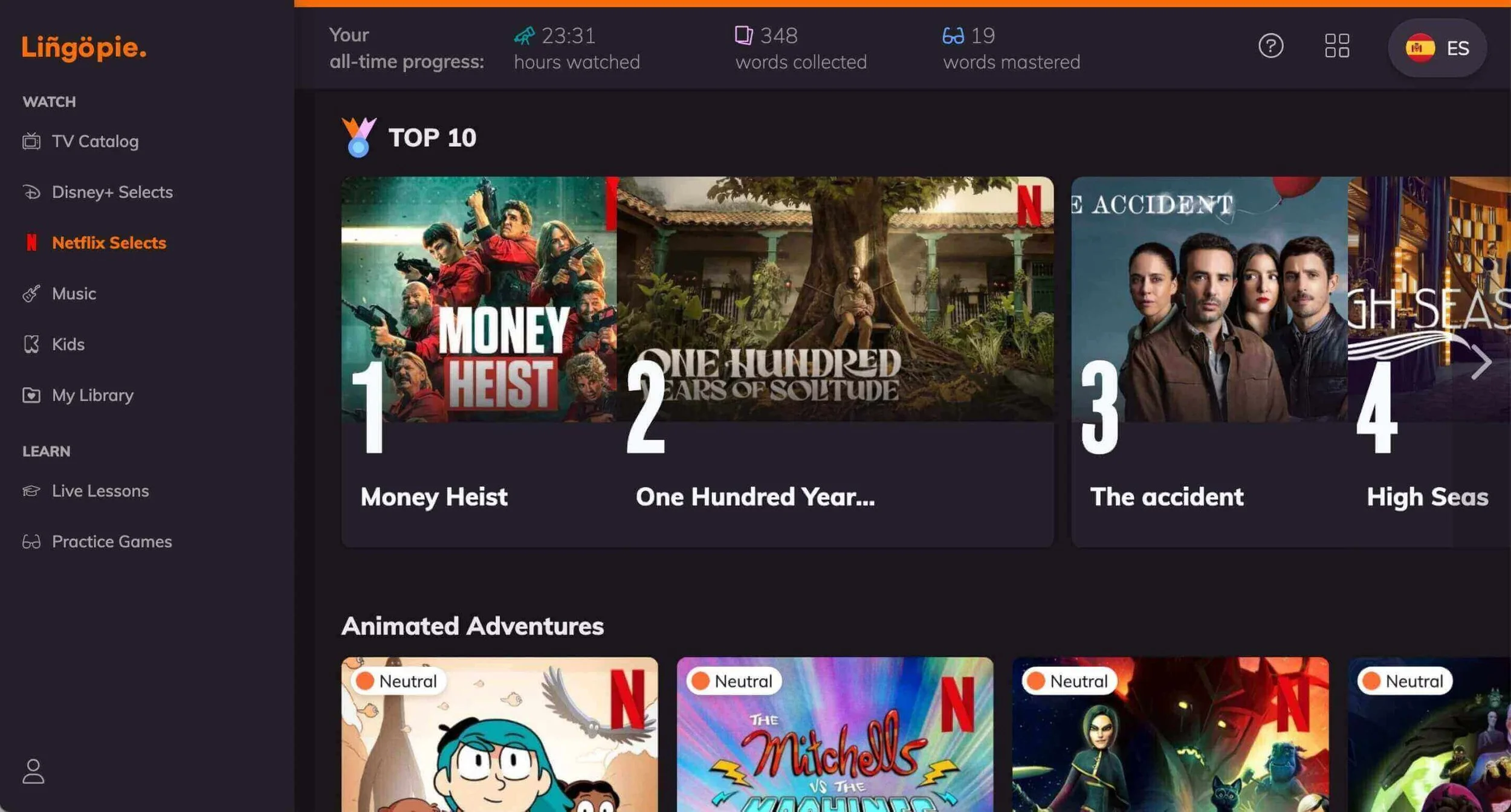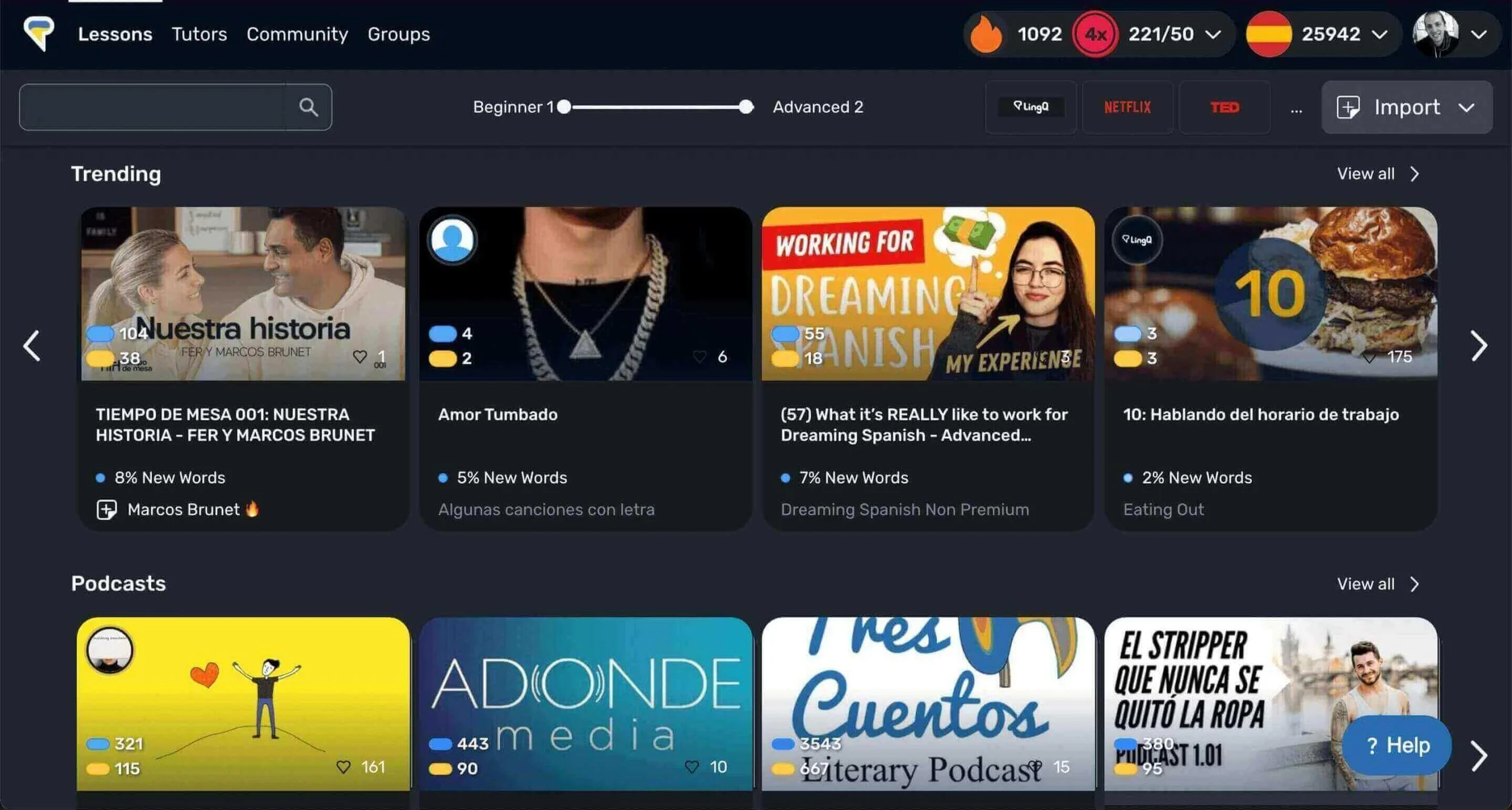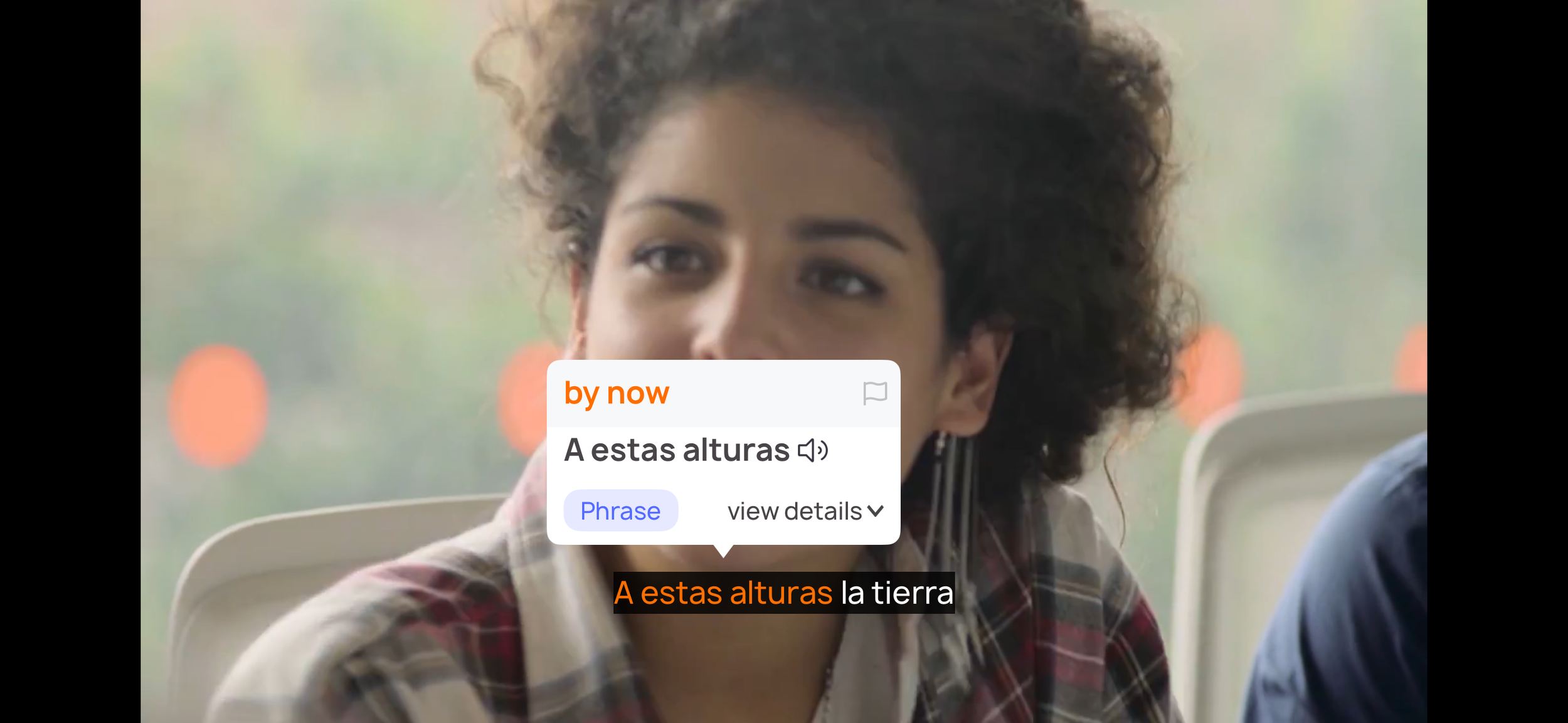Lingopie vs. LingQ: Which Platform Suits Your Learning Style Best in 2026?
*This blog is reader-supported. I may earn a commission on purchases made through links in this post. Read full Affiliate Disclaimer here.
This article was last updated on Jan 1st, 2026
Table of Contents
- Lingopie Explained: How It Works
- LingQ Explained: How It Works
- 9 Features Lingopie Has That LingQ Doesn’t
- 12 Features LingQ Has That Lingopie Doesn’t
- Main Differences: All-in-One Convenience or Unlimited Options?
- Highlighting the Similarities Between LingQ and Lingopie
- LingQ vs. Lingopie Pricing Comparison
- Two Different Types of Language Learners—Which One Are You?
- Which One Do I Personally Prefer—LingQ or Lingopie?
- Conclusion
After 6+ years using LingQ and more than a year of using Lingopie for my Spanish learning, here’s my honest take on which language learning app is the best in 2025.
Quick Verdict: Both are excellent, but your learning style determines the winner. LingQ is best for serious readers who want unlimited content options, while Lingopie suits learners who want an easy, plug-and-play learning experience through Netflix-style entertainment.
Quick Overview:
LingQ: Best for detail-oriented learners who love reading and want unlimited content flexibility (50+ languages)
Lingopie: Perfect for casual learners who want a fun way to learn through TV shows and movies (14 languages)
Choose LingQ if: You enjoy reading, want to import your own content, and like detailed progress tracking.
Choose Lingopie if: You prefer watching TV shows over reading and want a sleek, easy-to-navigate platform.
Lingopie Explained: How It Works
Get cozy and learn languages through binge-watching TV shows with Lingopie.
Lingopie, founded in 2019, is a language learning platform that helps you learn by immersing yourself in TV shows and movies. By watching native content, you can pick up vocabulary, grammar, and cultural nuances in an engaging and natural way.
It offers content in 14 languages, including native TV shows, short films, movies, podcasts, stories, and music videos and performances. All of them use Lingopie’s own high-quality, word-for-word subtitles with context-based definitions for words and sentences.
Toggle easily between dual-language subtitles in your target language and English (or your preferred ‘base language’). Click on any word in the subtitles to get instant definitions, which are saved to your flashcard deck. Review these flashcards using a ‘flashback-to-the-scene’ format or other word games, on both desktop and the mobile app.
Lingopie’s tools, like Audio Slowdown, Auto-Pause, Sentence Looping, and Explain AI, let you tailor content to your level and make learning stress-free and convenient.
With everything built into one app, there’s no need for external platforms.
For a full rundown of Lingopie’s features, check out my in-depth review: The Most Extensive Lingopie Review [Full feature breakdown]
Click below to start your free 7-day trial — and get 10% off all plans with your exclusive Lingtuitive discount:
LingQ Explained: How It Works
Read books and engage in content you love with LingQ.
LingQ was launched in 2007 by Steve Kaufmann and his son Mark to help people learn language through content that’s both authentic and engaging. It’s a versatile platform with a whopping 50 languages available.
With LingQ, you learn languages through reading and listening with its extensive content library, which includes podcasts, articles, mini stories, YouTube videos, books, and more.
LingQ color-codes words into three categories: 'New words' (blue), 'LingQs' (yellow), and 'Known words' (white), tracking them across content along with their definitions. You can quickly look up any word with the built-in pop-up dictionary, and even add your own definitions.
LingQ helps you review words naturally by encountering them in various contexts and content. As you engage with the content, your vocabulary expands, with progress tracked through stats like ‘words known’, ‘words learned today’, ‘words read’, and time spent listening.
LingQ rewards activity with coins, which you can earn by actions like clicking new words, moving a word to ‘known’, or reading a page. You also set a daily goal you need to fulfill to maintain your streak. This gamification keeps you motivated by showing stats like the number of ‘Known Words’ you have in the language, and gives you a clear visual of your progress over time.
The platform’s biggest strength is in the ability to import any content—e-books, news articles, blog posts, subtitles, YouTube videos, TED Talks, and more—giving you total freedom in choosing your learning materials.
For a deeper look at LingQ, see my in-depth review: LingQ Review: The Ultimate Guide After 6+ Years of Daily Use
9 Features Lingopie Has That LingQ Doesn’t
Here’s a list of features available on Lingopie that you won’t find in LingQ, along with the areas where it outshines LingQ:
No Learning Curve: Just sign up and start learning instantly.
Clean Design: A polished, sleek, and user-friendly experience on both desktop and mobile.
Toggle Subtitles ON/OFF: Turn on or off dual language subtitles with a click.
Smart TV App: Learn while watching TV shows from the comfort of your couch.
Explain AI: Receive clear, detailed explanations of each word in any sentence and its role within the context.
Stay Immersed: Look up words, phrases, and sentences without ever leaving the show you're watching.
Live Group Lessons: Learn together with other Lingopie users through interactive group lessons.
Engaging ‘Flashback’-style Flashcards: Review vocabulary with a short video clip from the exact scene where you first learned the word.
Lingopie Kids: A collection of kids' shows combined with Lingopie's intuitive design makes it the superior choice for young learners.
12 Features LingQ Has That Lingopie Doesn’t
Here’s a list of features available on LingQ that Lingopie doesn’t have, and some key areas where it’s superior to Lingopie:
50+ Languages Available: Access all of them on any LingQ plan.
Import Your Own Content: Upload e-books, articles, podcasts, Netflix subtitles, and any script or audio to create personalized lessons tailored to your interests.
Learn by Reading: Use the best e-reader for language learning to make progress while enjoying your favorite books, articles, or any text.
Whisper Integration: Automatically transcribes any audio into text.
Simplify Content With AI: Turn challenging content into a version that matches your level.
Control Translations: Swipe over multiple words to get a translation of the ones you choose, showing their meaning together in the context of the sentence.
Customizable Settings: Personalize LingQ with options for fonts, text size, themes, page layout, flashcards, dictionaries, pop-up preferences, and more.
Multiple Definitions: Create multiple and even add your own definitions for words to suit your understanding.
Comprehensive Progress Tracking: Monitor your learning journey with detailed LingQ statistics of your activity, progress, and milestones you hit.
Daily Streak Tracker: Stay motivated with clear daily goals that show exactly when you've achieved them.
Audio Playlists: Create custom playlists of podcasts and other material for easy learning on the go.
Challenges: Join monthly or tri-monthly challenges and compete with other LingQ learners.
Main Differences: All-in-One Convenience or Unlimited Options?
Apart from their distinct features, the two platforms differ in some broader key areas, mainly because of their different goals. Let’s stack up some of their differences side by side to get a better sense of how they differ from each other.
Content Options: Options vs. Ease of Use
LingQ: One of LingQ’s greatest strengths is its flexibility—you can turn virtually any content into a lesson. This means you’re never limited in what you can learn from. This flexibility lets you dive into content you’re genuinely interested in 100% of the time (as long as you can find it), offering unlimited freedom of choice.
Lingopie: Confines you to its curated library because it creates its own high-quality, word-for-word subtitles for every show, to ensure accuracy and highlight certain expressions. While Lingopie’s approach limits your options, it guarantees a seamless experience. Everything works great without any setup, saving you time and effort.
How You Learn
LingQ: The only one of the two that offers reading, which makes it a more diverse language learning platform. LingQ also makes it easier to listen on the go since you can create playlists of different podcasts and other content.
Lingopie: Is about learning through watching content, using subtitles and other tools to support that. With some additional content, such as stories, which is pure listening-based.
Subtitles and Syncing
LingQ: Every lesson in LingQ includes text and audio. Official lessons will have audio synced with text in "Karaoke Mode," while user-uploaded lessons may not have. However, users can automatically create time stamps by generating audio for all lessons, allowing “Karaoke Mode” to be used.
Lingopie: Features built-in, high-quality subtitles for all of the content. Subtitles are always fully synced with audio.
Progress Tracking
LingQ: Provides detailed stats to keep you motivated and track your progress. It shows total words learned, new words encountered, total words read, and listening time. You can view your progress over different time frames, such as today, the past week, month, or year, giving you a clear picture of your growth. Plus, you can set daily goals to build streaks, stay consistent, and celebrate milestones as you go.
Lingopie: Offers simple tracking, such as your total watch time, the ‘words collected’ during your immersion, and the ‘words mastered’ as you progress.
| If you want to... | Go with... |
|---|---|
| Learn by watching TV and listening to authentic, everyday language | Lingopie |
| Track every word you learn and follow your progress in detail | LingQ |
| Relax, have fun, and absorb language casually | Lingopie |
| Build a huge vocabulary base through reading | LingQ |
| Start learning right away with an easy-to-use platform | Lingopie |
| Import anything and learn 100% through your personal interests | LingQ |
Highlighting the Similarities Between LingQ and Lingopie
Even with two tools as seemingly different as Lingopie and LingQ, they actually have more in common than you might think. Here’s a list of some of their similarities.
Both….
…give you the option to review new words encountered in immersion through different word games.
…are based on interacting with content in the form of look-ups of words, expressions, and sentences.
…help you learn through learning real language in context.
…are available on desktops, tablets, and have native smartphone apps.
…have text-to-speech on any word you click on to hear how each word is pronounced.
…have 1-on-1 teaching options (though I recommend LanguaTalk as the best option for online 1-on-1 lessons—you can try a free 30-minute lesson to see if it’s a fit for you).
…are built on the foundation of learning through immersion:
Lingopie: With local native TV shows, movies, music, and audiobooks.
LingQ: With books, podcasts, Netflix subtitles, YouTube videos, news articles, and any text or audio you want to import.
…indicate difficulty level:
Lingopie: Uses Basic, Intermediate, and Advanced tags.
LingQ: Shows the percentage of unfamiliar (‘new’) words in each piece of content, as well as tags for different levels of Beginner, Intermediate, and Advanced.
…feature tools to help adjust challenging content to your level:
Lingopie: Uses tools like “Auto-Loop”, “Auto-Pause” (between sentences), and “Audio Slowdown” to make it easier and more manageable to learn from native content.
LingQ: Uses tools like “Sentence Mode” to break up content into more manageable bite-size pieces. LingQ also has a function called “Simplify with AI”, which let you take any text that would otherwise be too difficult for your current level and make a simplified version out of it.
…are suited for similar levels:
Both platforms can feel a bit challenging for absolute beginners, but they’re absolutely doable—and with a little persistence, you’ll find yourself making progress in no time. These platforms are ideal for levels ranging from Upper Beginner (A2) to Upper Intermediate (B2), though they can still be useful beyond that. Especially LingQ, which allows you to import more complex materials, like dissertation papers or complicated books, to learn from.
Want to learn how to use platforms like Lingopie and LingQ
to make consistent progress,
stay highly motivated,
and having fun while doing it?
Check out my guide, "Intuitive Language Secrets".
(Currently available for Free, though not sure for how long)
LingQ vs. Lingopie Pricing Comparison
Here’s the breakdown of both LingQ and Lingopie and how much each plan cost on their respective platforms.
LingQ Plans:
1-Month: $14.99/month
1-Year: $119.99/year ($10/month)
2-Year: $215.76/year ($8.99/month)
✅ All plans give you access to all languages.
Discount code auto-applied in cart:
Lingopie Plans:
3-Month Plan: $41.97 ($13.99/month) - one language only
1-Year Plan: $83.88 ($6.99/month) - all languages
Lifetime Plan: $229 (one-time payment) - all languages
✅ 1-Year & Lifetime: Access to all languages.
⚠️ 3-Month: One language only.
Our exclusive 10% discount makes Lifetime just $206!
Value Comparison
When it comes to pricing, Lingopie is the more affordable option. You can get a Lifetime Lingopie plan that’s comparable in price to a LingQ 2-year plan. That’s a one-time payment for unlimited access, forever, including all future updates in content, features, and new languages added.
That said, LingQ offers a different kind of value. You get access to way more languages than Lingopie and you can import just about anything — YouTube videos, e-books, articles — and turn it into study material. That gives you access to basically unlimited content. Just keep in mind: you’ll need to purchase any books you want to read with LingQ.
Two Different Types of Language Learners—Which One Are You?
Now that we've compared the differences and similarities between each platform, let's talk about something that's often overlooked—but probably more important than just weighing the pros and cons of each one:
Your personality type.
While there are definitely more nuances to consider, I have found that most language learners fall into two main categories:
The Laid-Back Learner
The Detail-Oriented Learner
I often hear arguments like, "This tool is better than that one because it has this and that function." That’s great, if you value functionality over convenience. But not everyone does. Some people couldn't care less about that. If that’s you, more options and tools just add stress and frustration, as they usually mean more work for you.
Let’s explore what sets these two types of learners apart and how LingQ and Lingopie cater to each one.
Which one do you lean more towards?
Lingopie: Perfect for the Laid-Back Learners
If you skimmed through lists of features in this post and just want something that works, you probably belong to the Laid-Back Learner-category.
You prefer things to be easy and straightforward, without having to tinker with settings. You also value a clean, attractive interface. To you, feel and simplicity is more important than how many tools, functions and customizations are available.
Lingopie is the embodiment of ‘it just works’—no bugs (or few at least), no complicated setups, and a user-friendly interface that lets you start learning right away. It's designed for those who want to dive in quickly and don’t want to fuss over features or technical adjustments. For this reason it also caters to less experienced learners.
The process is simple: watch shows you enjoy, click on words you don’t know for definitions, and, if you’d like, review them as flashcards or in other word games. It’s all about the experience of learning through content without the extra hassle.
If you’re not into TV shows or movies, then Lingopie obviously not for you. But if you do, Lingopie is your go-to. While it also offers things like music, stories, and Easy News, its main focus is on the shows.
Using the well-known DISC personality test framework, Lingopie is best suited for people leaning towards the 'I' (Influence) or 'Yellow' personality types.
If you're looking for a fun, low-pressure way to immerse yourself in your target language through watching TV, I highly recommend starting with Lingopie. It's made a huge difference in boosting my listening comprehension. Try a free 7-day trial + get an extra 10% off by clicking the button below:
LingQ: Ideal For The Detail-Oriented Learner
If you’re someone who likes to do your research before purchasing something, you probably belong to the group of Detail-Oriented Learners.
You’re the type of person who doesn’t mind spending some time browsing the web to find the perfect content. Whether it’s a podcast, e-book, YouTube video, or TV show to use for learning. To you, the idea of using what perfectly aligns with your interests is worth spending the extra time to find it.
You’re also an achiever-type person, who loves the sense of accomplishment you get from challenging yourself with a daily goal that you complete. Tracking your progress concretely is something that excites you and motivates you.
The idea of using something, that you won’t just be able to use for a few months or even a year, but during your entire learning journey, is also appealing to you.
If this sounds like you, LingQ is going to be an amazing fit for you (unless you don’t like reading at all). It’s a platform that’s an outstanding fit for people that love to stay organized, be thorough, and have clear goals while enjoying a customized language learning experience.
In the DISC personality test framework, LingQ is best suited for people leaning towards the 'C' (Conscientiousness) or 'Blue' personality types.
That being said, my wife, is for example not one of these people. She doesn’t like difficult things or too many details. She just happens to love reading and keeping a daily streak. For this case, she enjoys using LingQ and has read a dozen or more books in Swedish (although I’m the one uploading the books for her that she wants to read).
If you're like her, you might find it worthwhile to spend some time figuring out how to buy, import, and read books using LingQ. Once you get the hang of it, it’s fairly straightforward.
If you're more serious about building a huge vocabulary base through immersing in reading, LingQ is incredibly powerful. I have used it every single day for many years and I consider it a must-have language learning tool.
Which One Do I Personally Prefer—LingQ or Lingopie?
For me, choosing between the two platforms is tricky. I’m a detail-oriented learner who also loves convenience. It’s like I’m caught between two minds—one wants all the details, the other just wants to relax!
And funnily enough, I’m a mix of ‘I’ and ‘C’ in DISC, so this inner battle makes perfect sense.
However, if you were to send me to a deserted island with just one language learning app, I’d have to pick LingQ (as long as I also had access to an e-book store). I’ve used LingQ to read 17+ books in Finnish, a dozen or more in Cantonese, and a bunch in Spanish. I use it daily in all the languages I’m learning. It’s a must-have for my routine—not just because reading is the most effective way to expand our vocabulary, but also because it lets me explore new topics and grow as a person. I also love that I can have all sorts of audio content organized in one place through different playlists in LingQ.
Another big reason why LingQ is my go-to is that it supports all three languages I’m personally learning (Cantonese, Finnish, and Spanish), whereas Lingopie (currently) only supports Spanish. LingQ’s longevity is also tough to beat, since you’ll literally never run out of content, even though Lingopie update their library of shows and content every month.
That said, I’m an active user of both platforms. I’ve been using LingQ daily for 6 years+, and Lingopie I started using about 1.5 years ago which I have used daily in certain seasons. They each bring different benefits and experiences to my language learning in a way that complements each other.
If I was starting a new language today, however, I’d likely want to use Lingopie. I find using TV shows one of the most effective and fun ways to learn a language. It’s a great way to improve listening conversation and learn real language. However, I love how easy Lingopie is to use, whether on the desktop or phone app. It just makes learning a language a great and smooth experience.
Conclusion
As you can see, there’s no clear winner when comparing two of the best language learning platforms out there.
What it comes down to is:
What language(s) you’re learning
Your personal interests
Your learning style
Your personality type
In terms of effectiveness, you can’t go wrong with either. They’re simply vehicles for language content, helping your brain immerse in the material and improve your language comprehension. Both are also continuously improving their platforms and apps, adding more content and features.
To me, Lingopie vs. LingQ is a bit like the endless debate of iPhones vs. Androids.
LingQ is a bit like using an Android—it has more functions, is more open, and provides more flexibility, but is less intuitive. Lingopie is like using an iPhone—the system is more locked, but it looks and feels great, and works seamlessly.
Lingopie is an interactive dual subtitle TV show and movie immersion learning tool, while LingQ is more of an interactive e-reader with audio functions, progress tracker, and a gathering hub of all your learning content. Lingopie is like the Netflix of language learning, while LingQ is like the Kindle (and Audible) of language learning.
Do you want something that looks great, is super easy to use, works seamlessly, and lets you learn by watching TV? Sounds like Lingopie will be the perfect fit for you.
Do you like reading books, listening to podcasts, having a lot of options, the ability to import your own content, and closely track your progress? You can’t go wrong with LingQ.
Or maybe you’re like me and you like both? Nothing wrong with that, since both platforms have their unique strengths and experiences they offer.
Whichever one you decide to use, make sure to use the links below to try them out for Free and get the best available discounts on each platform:








